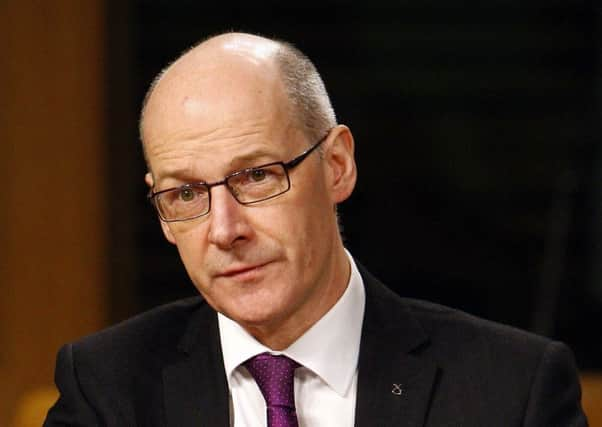Peter Jones: Independence as a route to prosperity?


This is no laughing matter, and certainly not remotely as funny as the famous Monty Python dead parrot sketch. I have no “glee” – this being the lame rebuke Ms Sturgeon directed at Kezia Dugdale, the Scottish Labour leader, when she raised this at First Minister’s Questions two weeks ago at the parlous state of the offshore oil and gas industry because of the collapsed oil price.
Indeed, I am alarmed that Aberdeen in particular and Scotland in general is facing a creeping economic crisis that may well end up costing yet more thousands of jobs. This, rather than political jibing and jousting over what is now clearly a complete constitutional fantasy, is what ought to be the top economic priority for politicians of all parties, particularly the SNP.
Advertisement
Hide AdAdvertisement
Hide AdUnfortunately, Mr Sturgeon and her party appear to be utterly denying reality, as we will probably hear again next week when finance secretary John Swinney presents his budget. That’s why the awful emptiness of Scotland’s fiscal cupboards need to be displayed again and again.
Political minds, including Nationalist ones, need to be focused 100 per cent on how to diversify and expand the Scottish economy because if we don’t, we will become even more dependent on the rest of the UK than we are already.
So I am not going to apologise for spending time nailing down the independence coffin lid. Let’s start with a few numbers.
In 2013-14, the last year for which the Scottish Government produced a public spending balance sheet, we had public spending of £66.4 billion and taxes (including a notional geographic share of oil revenues) of £54bn. So we had spent on us about £12.4bn more than we paid in taxes, which equates to 8.1 per cent of GDP or the total wealth created by our efforts that year, a much bigger deficit than the 5.6 per cent of GDP that the UK has as a whole.
Following methodology used by the Institute for Fiscal Studies, these numbers – particularly the percentages of UK taxes and spending that they represent – can be applied to the projections for future UK revenues and spending produced by the Office for Budget Responsibility (OBR) to get a rough estimate of Scotland’s likely budget balance in 2016-17, the mooted first year of independence.
A further adjustment has to be made for oil revenues. These were notionally £4bn in 2013-14, but are now foreseen by the OBR to be a mere £100 million that year, a miniscule 1.5 per cent of the sums of between £6.8bn and £7.9bn which a newly independent Scotland was supposed to be raking in.
It means that if Scotland’s economy, onshore tax revenues, and public spending grow in line with the UK, by 2016-17 Scotland would have spending of £71.5bn, tax revenues totalling £58.6bn – and a deficit of £12.9bn. Because of assumed economic growth (a big “if”, as North Sea GDP looks set to decline sharply) it is a lesser percentage of GDP – 7.1 per cent – than three years previously.
The numbers show clearly that independence could only have meant more and worse austerity. The European Union, as part of the price demanded of Scotland for membership and to prevent Scottish national debt rising to unsustainable bail-out necessitating proportions, would have insisted on the 7.1 per cent deficit being reduced over time to at least zero and probably to a surplus.
Advertisement
Hide AdAdvertisement
Hide AdAny supposed savings from not paying for Trident renewal barely make a dent in that. By the time the UK is projected by the OBR to be in surplus – 2019-20 – Scotland would still have a deficit of £8.4bn, or 4.1 per cent of GDP. And that is assuming that Scotland makes George Osborne’s spending cuts to which Ms Sturgeon is so opposed.
Of course, pro-indyites argue that with control of tax and spending levers, growth will be accelerated, tax revenues will rise, the deficit will disappear, and everybody will be much better off. I have yet to see a model showing which levers will be pulled and how they will achieve this result.
One way of showing the size of the task is an economic technique called intergenerational accounting. It aims to estimate the lifetime amount of taxes future generations will have to stump up to pay for the public debt our generation has run up and for the promises of future payments, such as the triple lock pension guarantee, that present governments are making.
The object is to show the degree of sustainability of current public finances and policy under various known circumstances, such as an ageing population. Ideally, someone born now should pay the same amount in taxes as has someone who has just retired. If they have to pay more, present taxes and policies are not sustainable. The numbers produced are illustrations rather than predictions.
Researchers at the National Institute of Economic and Social Research, led by Katerina Lisenkova, have made estimates comparing the UK as presently constituted and for Scotland under full fiscal autonomy. UK public finances turn out to be not sustainable, requiring tax increases of up to 3.7 per cent of GDP – but Scotland’s balances are much worse, needing tax increases of up to 9.9 per cent.
Even with 2 per cent annual productivity increases, which are above the 1998-2013 trend of 1.2 per cent and imply GDP growth about a third higher than historically, future Scots would still require to pay up to 8.2 per cent more in taxes than present taxpayers to pay for our debts and the spending promises we have made to them.
Independence as a route to greater Scottish prosperity is, in short, a complete mirage. It may become more possible some time way in the future, but that is only if this present generation lays constitutional bickering to one side and strains every sinew to confronting present foreboding realities.